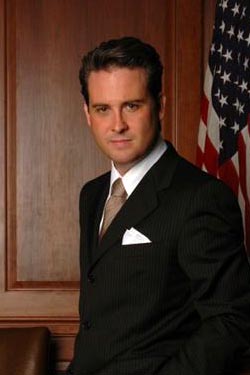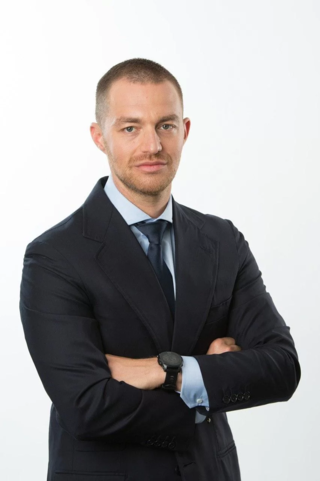Related Research Articles

Roman Arkadyevich Abramovich is a Russian businessman and politician. He is the former owner of Chelsea, a Premier League football club in London, England, and is the primary owner of the private investment company Millhouse. He has Russian, Israeli and Portuguese citizenship.

Mikhail Maratovich Fridman is a Ukrainian-born, Russian–Israeli tycoon. He is one of the co-founders of Alfa-Group, a multinational Russian conglomerate. According to Forbes, he was the second-richest Russian as of 2013, moving down to ninth-richest Russian in 2023. In May 2017, he was also ranked as Russia's most important businessman by bne IntelliNews. In February 2024, Fridman had a net worth of $13.1 billion, according to the Bloomberg Billionaires Index.

Vladimir Olegovich Potanin is a Russian businessman. He acquired his wealth notably through the controversial loans-for-shares program in Russia in the early to mid-1990s.

John Vincent Weber is an American politician, lobbyist and former Republican Congressman from Minnesota.
Russian oligarchs are business oligarchs of the former Soviet republics who rapidly accumulated wealth in the 1990s via the Russian privatisation that followed the dissolution of the Soviet Union. The failing Soviet state left the ownership of state assets contested, which allowed for informal deals with former USSR officials as a means to acquire state property.

Oleg Vladimirovich Deripaska is a Russian oligarch and billionaire. Deripaska enriched himself on previously state-owned assets that were privatized in the aftermath of the collapse of the Soviet Union. He is the founder of Basic Element, one of Russia's largest industrial groups, and Volnoe Delo, Russia's largest charitable foundation. He was the president of En+ Group, a Russian energy company, and headed United Company Rusal, the second-largest aluminum company in the world, until he quit both roles in 2018.

The Foreign Agents Registration Act (FARA) is a United States law that imposes public disclosure obligations on persons representing foreign interests. It requires "foreign agents"—defined as individuals or entities engaged in domestic lobbying or advocacy for foreign governments, organizations, or persons —to register with the Department of Justice (DOJ) and disclose their relationship, activities, and related financial compensation.

Alexander Stalyevich Voloshin is a Russian politician who briefly was chairman of the board of directors of RAO UES, the former Russian state power utility, which was liquidated as part of the country's comprehensive power sector reforms on 1 July 2008. He has the federal state civilian service rank of 1st class Active State Councillor of the Russian Federation.

Igor Ivanovich Sechin is a Russian oligarch and a government official, considered a close ally and "de facto deputy" of Vladimir Putin.

Richard R. Burt is an American businessman and diplomat who served as United States Ambassador to Germany and was a chief negotiator of the Strategic Arms Reduction Treaty. Prior to his diplomatic career, Burt worked as director of a non-governmental organization and from 1977 to 1980 was a national security correspondent for The New York Times.

John Houghtaling is an American attorney and oil and gas executive. In 2014, Houghtaling's career was featured on an episode of Inside Man with Morgan Spurlock. He is currently the CEO of an oil and gas export company, American Ethane and is the majority owner of the law firm of Gauthier, Murphy & Houghtaling.
BGR Group is a lobbying and communications firm based in Washington, D.C., with offices in London, Beijing and Austin, Texas. Founded in 1991 by former White House aides Ed Rogers and Haley Barbour, the firm was joined by Lanny Griffith to form Barbour Griffith & Rogers. In 2019, BGR was recognized by both The Hill and Bloomberg as a "Top Performing Lobbying Firm".
International sanctions have been imposed against Russia and Crimea during the Russo-Ukrainian War by a large number of countries, including the United States, Canada, the European Union, and international organisations following the Russian annexation of Crimea, which began in late February 2014. Belarus has also been sanctioned for its cooperation with and assistance to Russian armed forces. The sanctions were imposed against individuals, businesses, and officials from Russia and Ukraine. Russia responded with sanctions against several countries, including a total ban on food imports from Australia, Canada, Norway, Japan, the United States, the EU and the United Kingdom.
Nord Stream 2 is a 1,234-kilometre-long (767 mi) natural gas pipeline from Russia to Germany running through the Baltic Sea, financed by Gazprom and several European energy companies. Feasibility studies began in 2011 to expand the Nord Stream 1 line and double annual capacity to 110 billion cubic metres, with construction beginning in 2018. It was completed in September 2021, but has not yet entered service. Planning and construction of the pipeline were mired in political controversy over fears that Russia would use it, one of 23 pipelines between Europe and Russia, for geopolitical advantage with Europe and Ukraine.
Donald Trump has pursued business deals in Russia since 1987, and has repeatedly traveled there to explore potential business opportunities. In 1996, Trump trademark applications were submitted for potential Russian real estate development deals. Trump, his children, and his partners have repeatedly visited Russia, connecting with real estate developers and Russian government officials to explore joint venture opportunities. Trump was never able to successfully conclude any real estate deals in Russia. However, individual Russians have invested heavily in Trump properties, and, following Trump's bankruptcies in the 1990s, he borrowed money from Russian sources. Both Donald Trump Jr. and Eric Trump have said that Russia was an important source of money for the Trump businesses.
This is a timeline of events related to Russian interference in the 2016 United States elections.

The Countering America's Adversaries Through Sanctions Act (CAATSA) is a United States federal law that imposed sanctions on Iran, North Korea, and Russia. The bill was passed by the Senate on July 27, 2017, 98–2, after it passed the House 419–3. It was signed into law on August 2, 2017, by President Donald Trump, who nevertheless believed that the legislation was "seriously flawed".
Konstantin Yuryevich Nikolaev is a Russian billionaire and businessman who is a financial supporter of Maria Butina, a co-owner of the Tula Cartridge Plant that supplies very large amounts of ammunition to Russian forces during Russia-Ukraine War, American Ethane, N-Trans and Globaltrans, the largest private rail operator in Russia, CIS, and the Baltic states. He is only under sanctions by Ukraine. According to the Forbes, in 2019 Nikolaev's net worth was estimated at $1.2 billion.

Alexander Semenovich Vinokurov is a Russian businessman. He is one of the main owners of the privately held investment company Marathon Group and the largest shareholder of retailer Magnit. Vinokurov was added to the EU Sanctions List on 9 March 2022 for providing a substantial source of revenue to the government of the Russian Federation during the Russo-Ukrainian War.

The unfriendly countries list is a list of countries published by the Russian government that it says "commit unfriendly actions against Russia, Russian companies and citizens". Countries added to the list are subject to certain restrictions related to their relationships with Russia, including trade and currency restrictions and personnel limits in the listed countries' diplomatic missions in Russia.
References
- ↑ "Company Overview of American Ethane Company, LLC". Bloomberg Business . Retrieved October 19, 2018.
- 1 2 3 4 5 6 7 8 Hammer, David (July 12, 2018). "New Orleans gas exporter's partners include ex-Putin aide: But John Houghtaling's recent megadeal with China does not appear to help the Russian leader's interests". 4WWL . New Orleans . Retrieved October 19, 2018.
- ↑ "Бывший советник Путина владеет долей в энергетической компании США — Guardian" [Former adviser to Putin owns a stake in the US energy company - Guardian]. «Антикор» (Antikor) (in Russian). July 11, 2018. Retrieved October 19, 2018.
- ↑ Пастушин, Алексей (Pastushin, Alexey) (July 11, 2018). ""Трамп аплодировал и кивал": зачем Абрамович и Волошин вложились в производство этана" [“Trump applauded and nodded”: why did Abramovich and Voloshin invest in ethane production]. Forbes (in Russian). Retrieved October 19, 2018.
{{cite news}}: CS1 maint: multiple names: authors list (link) - 1 2 3 Soraghan, Mike (August 1, 2018). "U.S. ethane exporter linked to Russian owners and spy case". E&E News . Retrieved October 19, 2018.
- 1 2 3 4 5 6 7 8 Harding, Luke (July 10, 2018). "Former Putin adviser has secret investment in US energy firm praised by Trump: Alexander Voloshin has undisclosed stake in American Ethane - which has been hailed by Donald Trump". The Guardian . Retrieved October 19, 2018.
- 1 2 3 4 "American Ethane Co. in New Orleans signing $26 billion China export deal". New Orleans Advocate . November 8, 2017. Retrieved October 19, 2018.
- ↑ "Board of Directors". American Ethane. Retrieved October 19, 2018.
- 1 2 3 "The Energy & Minerals Group and American Ethane Announce Execution of Exclusive Arrangement". Business Wire . March 19, 2018. Retrieved October 19, 2018.
- ↑ Murtaugh, Dan; Guo, Aibing; Collins, Ryan (November 9, 2017). "China's Appetite for U.S. Energy Falls Shy of Binding Deals". Bloomberg Markets . Retrieved October 19, 2018.
- ↑ LaRocco, Lori Ann (November 9, 2017). "These are the 37 major deals US firms signed with Chinese entities during Trump's visit". CNBC . Retrieved October 19, 2018.
- 1 2 De Lea, Brittany (November 16, 2017). "Despite Trump's $250B announcement, companies hesitant to sign binding deals with China". FOX Business . Retrieved October 19, 2018.
- ↑ "Executive Profile: John T. Raymond". Bloomberg Business . Retrieved October 19, 2018.
- ↑ "Company Overview of The Energy & Minerals Group". Bloomberg Business . Retrieved October 19, 2018.
- ↑ "Луизианская сага Абрамовича, Волошина, Николаева и Юрьева" [Louisiana saga of Abramovich, Voloshin, Nikolayev and Yuriev]. RosPress (in Russian). August 6, 2018. Archived from the original on November 29, 2018. Retrieved November 19, 2018.
- 1 2 3 4 5 6 Добровольская, Лили (Центр «ТИ — Р»); Хаммер, Дэвид (WWLTV Channel 4) (August 2, 2018). "Как лоббировали газовый бизнес Александра Волошина в Луизиане и Техасе" [How did the lobbying occur for the gas business of Alexander Voloshin in Louisiana and Texas]. Transparency International - Russia: Russians in America (in Russian). Archived from the original on November 29, 2018. Retrieved December 20, 2018.
{{cite news}}: CS1 maint: numeric names: authors list (link) - ↑ "Lobbying Registration for American Ethane". Lobbying Disclosure Act of 1995 (Section 4). April 15, 2014. Retrieved November 19, 2018.
- ↑ "American Ethane". FEC website. 2017–2018. Retrieved November 19, 2018.
- ↑ Brown, Cynthia (December 4, 2017). "The Foreign Agents Registration Act (FARA): A Legal Overview" (PDF). Congressional Research Service (CRS): Informing the legislative debate since 1914 . Retrieved December 20, 2018.
- ↑ "Константин Николаев — украшение коллекции мужчин Марии Бутиной" [Konstantin Nikolaev - the decoration of the collection of men by Maria Butina]. Руспрес (in Russian). July 24, 2018. Retrieved December 20, 2018.